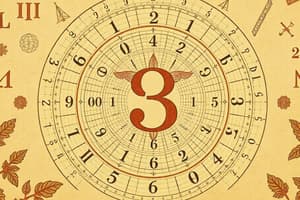Podcast
Questions and Answers
What property states that the order of addition does not affect the sum?
What property states that the order of addition does not affect the sum?
- Associativity
- Commutativity (correct)
- Distributivity
- Identity
Which branch of mathematics is primarily concerned with the study of shapes and sizes?
Which branch of mathematics is primarily concerned with the study of shapes and sizes?
- Calculus
- Geometry (correct)
- Algebra
- Number Theory
What is the primary focus of differential calculus?
What is the primary focus of differential calculus?
- Studying equations
- Accumulating quantities
- Defining shapes
- Finding rates of change (correct)
What type of reasoning is used to prove mathematical theorems and generalizations?
What type of reasoning is used to prove mathematical theorems and generalizations?
Which of the following best describes a prime number?
Which of the following best describes a prime number?
What formula would you use to calculate the perimeter of a rectangle?
What formula would you use to calculate the perimeter of a rectangle?
How can the perimeter of an irregular shape be determined?
How can the perimeter of an irregular shape be determined?
What is the relationship between the radius and the circumference of a circle?
What is the relationship between the radius and the circumference of a circle?
Why is measuring perimeter important in engineering and construction?
Why is measuring perimeter important in engineering and construction?
How can you find an unknown side length of a triangle if the perimeter is known?
How can you find an unknown side length of a triangle if the perimeter is known?
Flashcards
Fundamental Operations of Arithmetic
Fundamental Operations of Arithmetic
The basic calculations like addition, subtraction, multiplication, and division.
Mathematical Reasoning
Mathematical Reasoning
Using logic to prove or find patterns in math.
Algebraic Variables
Algebraic Variables
Letters or symbols representing unknown numbers in math problems.
Set Theory
Set Theory
Signup and view all the flashcards
Calculus
Calculus
Signup and view all the flashcards
Perimeter
Perimeter
Signup and view all the flashcards
Calculating Perimeter: Rectangle
Calculating Perimeter: Rectangle
Signup and view all the flashcards
Perimeter of Irregular Shapes
Perimeter of Irregular Shapes
Signup and view all the flashcards
What is circumference?
What is circumference?
Signup and view all the flashcards
Units of Measurement for Perimeter
Units of Measurement for Perimeter
Signup and view all the flashcards
Study Notes
Fundamental Concepts
- Mathematics is the study of quantity, structure, space, and change.
- It uses logic and abstraction to build models and solve problems.
- Key branches include algebra, geometry, calculus, and number theory.
Arithmetic
- Fundamental operations include addition, subtraction, multiplication, and division.
- Properties like commutativity (a + b = b + a), associativity ((a + b) + c = a + (b + c)), and distributivity (a(b + c) = ab + ac) are essential.
- Understanding place value is critical for performing operations.
- Different number systems exist, including integers, rational numbers, irrational numbers, and real numbers.
Algebra
- Studies symbolic representation of mathematical objects.
- Focuses on relationships between variables.
- Solves equations and inequalities.
- Uses variables and constants to represent unknown values.
- Covers topics like linear equations, quadratic equations, polynomials, and systems of equations.
Geometry
- Deals with shapes, sizes, and positions of objects in space.
- Includes plane geometry (2D shapes) and solid geometry (3D shapes).
- Concepts like points, lines, angles, triangles, quadrilaterals, circles, and volumes are crucial.
- Geometric transformations like rotations, reflections, and translations are also studied.
- Euclidean geometry is a cornerstone, focusing on axiomatic systems and deductive reasoning.
Calculus
- Deals with continuous change.
- Includes differential calculus (rates of change) and integral calculus (accumulation of quantities).
- Key concepts include derivatives, integrals, limits, and infinite series.
- Applications include modeling physical phenomena and solving optimization problems.
Number Theory
- Focuses on properties of integers.
- Studies prime numbers, divisibility, modular arithmetic, and Diophantine equations.
- Has significant applications in cryptography and computer science.
Logic in Mathematics
- Mathematical reasoning is based on logical principles.
- Deductive and inductive reasoning are used to prove theorems and make generalizations.
- Mathematical proofs are structured arguments to demonstrate the truth of a statement.
Sets and Relations
- Sets are collections of objects.
- Set theory provides a fundamental framework for defining mathematical concepts.
- Relations define connections between elements of sets.
- Different types of sets and relations (e.g., functions, equivalence relations) are essential.
Probability and Statistics
- Probability studies the likelihood of events.
- Statistics uses data analysis to draw conclusions from samples.
- These fields are applied in various fields, including finance, science, and social sciences.
Discrete Mathematics
- Focuses on countable or discrete objects and structures.
- Includes graph theory (networks), counting techniques, and combinatorics.
- Relevant in computer science, operations research, and other fields.
Studying That Suits You
Use AI to generate personalized quizzes and flashcards to suit your learning preferences.




